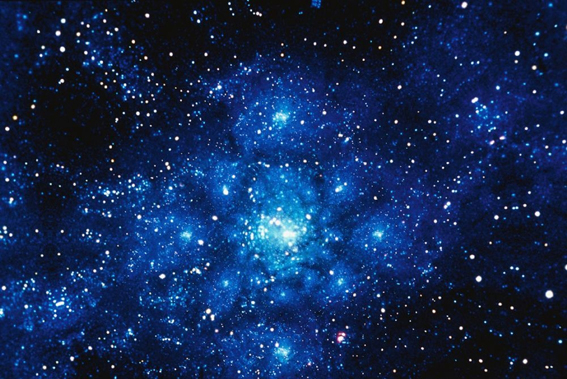(单词翻译:单击)
Supernovae are significant to us in one other decidedly central way. Without them we wouldn't be here. You will recall the cosmological conundrum with which we ended the first chapter—that the Big Bang created lots of light gases but no heavy elements. Those came later, but for a very long time nobody could figure out how they came later.
超新星还有一方面对我们来说是绝对重要的。要是没有了超新星,我们就不会来到这个世界上。你会想得起来,第一章快结束的时候,我们谈到宇宙之谜--大爆炸产生了许多轻的气体,但没有创造重的元素。重元素是后来才有的,但在很长时间里,谁也搞不清它们后来是怎么产生的。

The problem was that you needed something really hot—hotter even than the middle of the hottest stars—to forge carbon and iron and the other elements without which we would be distressingly immaterial. Supernovae provided the explanation, and it was an English cosmologist almost as singular in manner as Fritz Zwicky who figured it out.
问题是,你需要有某种温度确实很高的东西--比温度最高的恒星中央的温度还要高--来锻造碳、铁和其他元素;要是没有这些元素,我们就令人苦恼地不会存在。超新星提供了解释。这个解释是一位几乎像弗里茨•兹威基一样行为古怪的英国宇宙学家作出的。
He was a Yorkshireman named Fred Hoyle. Hoyle, who died in 2001, was described in an obituary in Nature as a "cosmologist and controversialist" and both of those he most certainly was. He was, according to Nature 's obituary, "embroiled in controversy for most of his life" and "put his name to much rubbish." He claimed, for instance, and without evidence, that the Natural History Museum's treasured fossil of an Archaeopteryx was a forgery along the lines of the Piltdown hoax, causing much exasperation to the museum's paleontologists, who had to spend days fielding phone calls from journalists from all over the world.
他是约克郡人,名叫弗雷德·霍伊尔。霍伊尔死于2001年,在《自然》杂志的悼文里被描写成一位"宇宙学家和好辩论的人",二者他都受之无愧。《自然》杂志的悼文说,他"在一生的大部分时间里都卷入了争论",并"使自己名声扫地"。比如,他声称,而且是毫无根据地声称,伦敦自然史博物馆里珍藏的那件始祖鸟化石是假的,与皮尔当人头盖骨的骗局如出一辙,这使得博物馆的古生物学家们非常恼火。他们不得不花了几天工夫来回答记者们从世界各地打来的电话。
He also believed that Earth was not only seeded by life from space but also by many of its diseases, such as influenza and bubonic plague, and suggested at one point that humans evolved projecting noses with the nostrils underneath as a way of keeping cosmic pathogens from falling into them.
他还认为,地球不仅从空间接受了生命的种子,而且接受了它的许多疾病,比如感冒和腺鼠疫。他有一次还提出,人类在进化过程中有了突出的鼻子和朝下的鼻孔,就是为了阻止宇宙病原菌掉进去。


